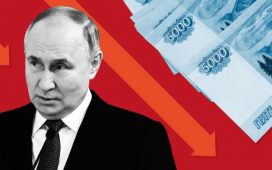Unlock the Editor’s Digest for free
Roula Khalaf, Editor of the FT, selects her favourite stories in this weekly newsletter.
Moscow has set terms for a proposed swap of Russian and western investors’ frozen assets, allowing each side to claw back lost value after sanctions were imposed over President Vladimir Putin’s war in Ukraine.
The Kremlin hopes the potential exchange, announced by the finance ministry on Monday, will unblock about Rbs100bn ($1.1bn) in European securities, mostly owned by Russian retail investors, by letting western investors buy them with their own stranded funds.
The exchange of stranded securities is the first step in a plan to compensate 3.5mn Russian retail investors, who hold a total of Rbs1.5tn ($16.5bn) in assets in western countries, under a decree signed by Putin last year.
The western assets on offer are mostly shares and depository receipts in blue-chip stocks held through accounts at Russian brokerages and frozen by the sanctions.
Russia’s finance ministry has appointed Investitsionnaya Palata, which is not under sanctions, to organise the trade. The little-known broker is based in Voronezh, a city in Russia’s southern agricultural heartland, and has said its assets under management swelled more than 50 times in 2022 after sanctioned Russian brokers moved clients’ western securities there.
Russian retail investors can submit offers to swap western securities from March 25, according to Investitsionnaya Palata.
Western investors can bid for them from June 3 using funds from “type C” accounts, which are not usually allowed to be transferred outside Russia, although it is not clear whether western regulators will allow their participation in the scheme.
Russia holds about Rbs600bn of frozen western assets on these accounts, according to news agency Interfax. These include institutional assets such as Russian state bonds as well as private securities and profits that western companies generated in Russia after the full-scale invasion of Ukraine two years ago.
Russian investors will not be allowed to sell more than Rbs100,000 worth of western assets each, according to the finance ministry. Russia’s central bank says about 2.5mn retail investors hold western securities under that threshold. The finance ministry’s deadline for completing the trades is September 1.
Private investment has soared in Russia on the back of campaigns from financial authorities and banks and brokerage firms to broaden the market. There are now an estimated 30mn private investors in the country.
Investment by Russians in foreign stocks — with Apple, Netflix and Amazon among the most popular — has increased significantly, from a few billion roubles in 2019 to almost Rbs1tn by early 2022. After sanctions were imposed, some retail investors initially demanded compensation or the unfreezing of assets, prompting efforts by the Kremlin to find a solution.
In turn foreign investors have traditionally held a large share of Moscow’s sovereign assets — at its peak in 2020, they accounted for around 35 per cent of Russian government debt, according to central bank estimates.
The Russian-owned assets on offer are distinct from the €300bn in central bank reserves frozen by the G7 group of nations after the outbreak of war in Ukraine.
The US has pushed its G7 allies to seize the Russian sovereign assets, mostly comprised of around €190bn held at Belgium-based depository Euroclear, and use them to fund Ukraine’s military. But many EU countries do not back the proposals.
The divisions over how to give Ukraine the assets legally and fears of retaliation from Moscow have led EU countries to focus on using the windfall profits from those assets, which generate about €3bn a year, to fund Kyiv instead.
According to EU officials, Euroclear already faces more than 100 court cases in Russia over assets immobilised under EU sanctions. At the same time, western assets worth €33bn have been immobilised at Russia’s National Settlement Depository, according to the officials, and are at risk of being seized by the Kremlin through the court rulings.
Russian central bank officials have claimed that western institutional investors want to participate in the swap scheme and said more exchanges could follow.
But the central bank has had no contact with its counterparts over the swap and implied investors holding stranded funds in Russia would have to convince western regulators to let them join the scheme.
The Russian finance ministry and the central bank did not immediately respond to requests for comment.











